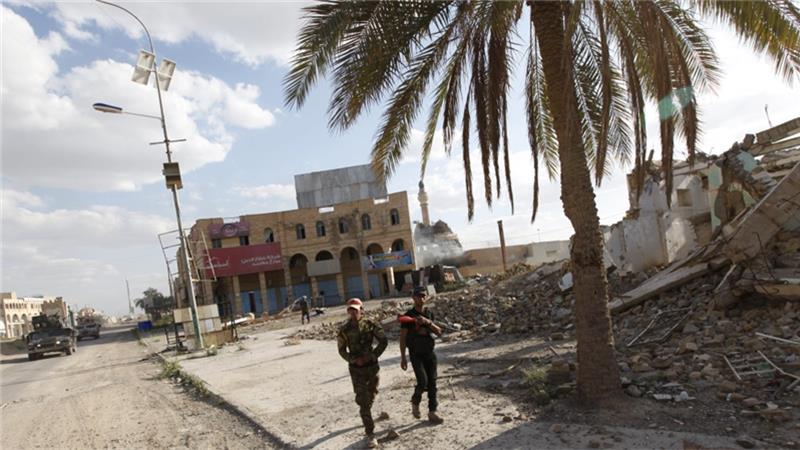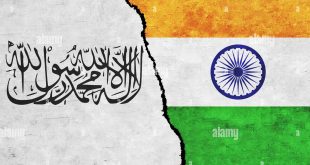Tribal rivalries in Tikrit motivated the recent wave of looting and reprisals, Iraqi officials say.
Baghdad – Arson and looting incidents in Tikrit after the Iraqi army recaptured the city last week from fighters with the Islamic State of Iraq and the Levant (ISIL) have highlighted the deep divisions between the Sunni tribes that supported ISIL and the Sunni tribes that opposed it, local and federal security officials said.
Those divisions threaten to tear apart the Sunni community in the areas still under ISIL control, Iraqi officials said.
Hundreds of homes and stores were set ablaze after they were looted by unidentified people last week in Tikrit, one of the biggest Iraqi cities dominated by a Sunni Muslim population. It was seized by ISIL last summer.
More than 30,000 Iraqi security troops as well as the Popular Mobilisation forces, a multi-sect force, have since regained control of the city, forcing ISIL fighters to flee after a month-long battle.
RELATED: After ISIL, what Tikritis found when they came home
The looting and burning of shops and houses spread in Tikrit and its suburbs after the joint forces recaptured the city entirely and raised the Iraqi flag on its buildings, security officials and eyewitnesses told Al Jazeera. “Many of the houses [in Tikrit and its suburbs] were either destroyed by air strikes or artillery shelling, which was done by our troops and US-led coalition forces, because they were places for snipers or the headquarters of Daesh [ISIL] leaders,” a senior federal police officer told Al Jazeera on condition of anonymity as he was not authorised to talk to the media.
“But the deliberate burning of the other houses and stores began when the troops of the Salahuddin local police got into the city. They were targeting the properties of Daesh members and their collaborators,” the officer said.
Every province in Iraq has a local police force whose members hail exclusively from the residents of that province.
Security officials told Al Jazeera that the local Salahuddin police force primarily includes the sons of the tribes that sided with the government in its war against ISIL.
Local officials and the federal officer said Shia militias were “partially” participating in Tikrit’s burning and looting incidents, as they were encouraging the perpetrators to carry out more burnings and lootings by turning a blind eye.
“What happened in Tikrit was an act of revenge… Hundreds of houses and stores in Albu Ajail and al-Dour were looted and burned by infiltrators working under the umbrella of the popular mobilisation,” Thiyab al-Ajaili, a Sunni lawmaker and former minister who belongs to the Albu Ajail tribe, told Al Jazeera.
“Our information indicates that many perpetrators were mainly from [Salahuddin], but the whole area was under the control of the popular mobilisation and no one could have done anything without their assistance,” Ajaili said.
RELATED: Meet the fighters preparing to retake Mosul from ISIL
Eyewitnesses and local officials told Al Jazeera that most of the houses and stores looted and burned in Tikrit and its outskirts were owned by former senior Baathist leaders, former senior Iraqi Army officers and members of the tribes of Albu Ajail, Albu Nasser (the tribe of the late Iraqi President Saddam Hussein) and Albu Badr (the tribe of ISIL top leader Abu Bakr al-Baghdadi).
These tribes are primarily blamed by Shia Muslims for the Camp Speicher massacre, in which around 1,700 Iraqi soldiers were slaughtered by ISIL last June in Tikrit. Iraqi Prime Minister Haider al-Abbadi ordered the withdrawal of the Popular Mobilisation troops from the city and handed security control back to the local police, as initial accusations were directed against Shia militias, which represent the backbone of the Popular Mobilisation troops.
However, the testimonies of the owners of the burned properties have told a contrasting story.
“He who burned my house was a young man from Tikrit. I know him very well. They [the Shia militias] do not know the identity of the owners of these houses and stores, so how would they burn them?” Ala’a Nashou’a, a former senior Baathist, told Al Jazeera by phone from Erbil.
“The militias were providing cover for the perpetrators who were from Tikrit and al-Alam [town], to break into houses and stores to loot and burn them later,” Nashou’a said. “[The perpetrators] are motivated by personal grudges and treated everyone as supporters of Daesh [ISIL].”
Tikrit city – located 160km northwest of Baghdad, and also known as Saddam’s hometown – is dominated by Sunni tribes, a majority of whom enjoyed plenty of privileges during Saddam’s era, with the majority of senior posts occupied at the time by their sons.
But after Saddam was toppled, the tribes became hostile to the new rulers in Baghdad. Many members joined the Sunni insurgency against the US occupation of Iraq and the new Shia-led government in Baghdad, as they felt marginalised and targeted by the new political system.
According to political analysts, other Sunni tribes, such as the al-Joubor tribe, were marginalised under Saddam’s rule. In the post-Saddam years, al-Joubor became affiliated with the government.
“The hatred rooted among these tribes and the chaos that followed the recapture of Tikrit was an opportunity to settle scores between the two parties [the pro-ISIL Sunnis and the anti-ISIL Sunnis],” Lataif Ghareeb, an independent political analyst, told Al Jazeera. “Many of al-Joubor’s heads of tribes and officials were slaughtered by al-Qaeda and Daesh during the last few years, and now they believe it is time to take revenge.”
Al-Joubor was the first and biggest tribe to join the Iraqi security forces in their fight against ISIL in Salahuddin province and other areas since last year. They became an integral part of the Popular Mobilisation forces. Furthermore, since 2003, tribal figures have been occupying most of the senior posts within the local government.
Marown al-Jbara, a spokesperson for the Salahuddin tribal provincial council and one of the most influential men in al-Jobour tribe, told Al Jazeera that the pictures and the names of the wanted people who were members of ISIL or collaborators were being circulated at security checkpoints in and around Salahuddin.
“The ones already wanted [by the Iraqi security forces] will not come back [to Salahuddin] and even their families will not dare to come back, as they are afraid of reprisals,” Jbara said.
Observers say the liberated areas in Salahuddin are witnessing a demographic change, as al-Joubor tribe will not allow displaced families belonging to tribes seen as pro-ISIL to go back to their homes. This will sooner or later lead to the dismantling of the Sunni community in Salahuddin and other provinces, observers noted.
“The tribal Sunni community in Iraq is very complicated and established. The other Sunni tribes [outside Salahuddin] are watching the situation closely, but later fighting may erupt between these tribes [the pro-ISIL and anti-ISIL tribes],” Ghareeb said. “This will definitely impact the government’s war against Daesh”. (Al Jazeera)
 Afghanistan Times
Afghanistan Times




